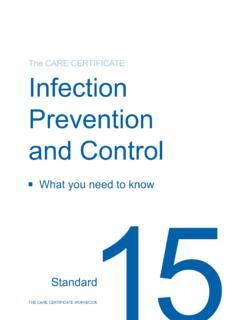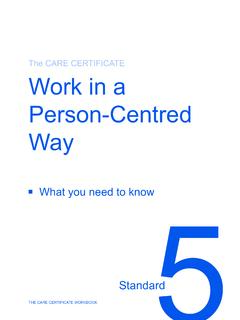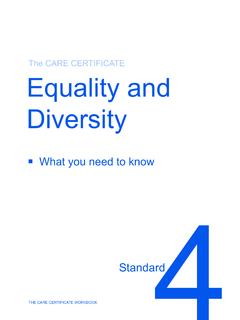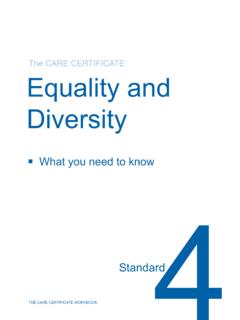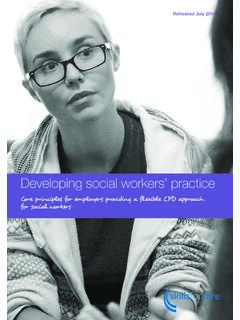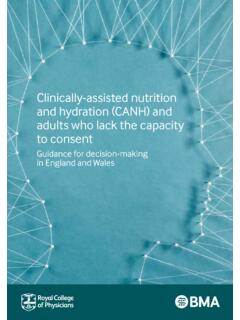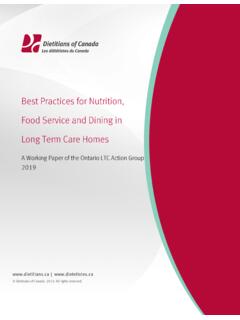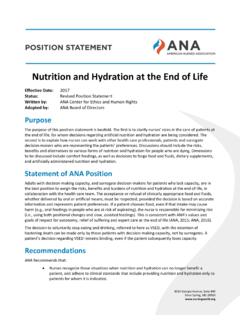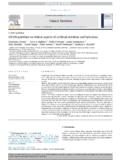Transcription of Understanding roles - working together to improve end of ...
1 Understanding roles : working together to improve end of life care Understanding roles : working together to improve end of life care 1. Understanding roles : working together to improve end of life care Contents page Introduction The person View >> receiving care View >>. Primary carer Commissioner Dietician View >> View >> View >>. District nurse Domiciliary Funeral View >> (home) care director worker View >>. View >>. GP (General Grief/ Hospice Practitioner) Bereavement worker View >> counsellor View >>. View >>. 2. Understanding roles : working together to improve end of life care Hospice at Occupational Paramedic home nurse therapist (OT) View >>. View >> View >>. Palliative care Pharmacist Physiotherapist View >>. specialist (Physio).
2 View >> View >>. Social worker Speech and Spiritual, faith View >> language and religious therapist support View >> View >>. Who to call Glossary Useful links when and how View >> and resources to contact View >>. them View >>. 3. Understanding roles : working together to improve end of life care Introduction It is only by Understanding the roles , skills and experiences of others that it is possible to work together effectively to give people who are dying the very best care and support at the end of their lives. This booklet complements the film Understanding roles - working together to improve end of life care ' by briefly describing a range of people and roles that may be involved in end of life care and how they work together .
3 It draws on the experiences of people who use care and support services, those with personal experience of caring for someone close to them at the end of life and professionals who provide care . You can watch the film online by visiting Information shared in the film and this booklet comes from conversations with people who currently carry out the roles described. The exact nature of roles varies both individually and regionally. This isn't, therefore, a definitive guide but illustrates the kinds of activities that are common and core in end of life care . In the film and this guide, the person receiving support from health and care services has Motor Neurone Disease but the information they share could be relevant to any condition.
4 Similarly, the issues identified by the primary carer are some of those commonly identified by carers supporting someone who is dying. Whilst each individual role is important, it's crucial that everyone comes together to support the person who is dying and those close to them. In order to do this, usually a member of the team takes on the role of co-ordinator or key worker', taking responsibility for ensuring that all involved are working together and have the information that they need, including carers and family members. This activity can be undertaken by any member of the team, giving flexibility in how they respond to people's individual strengths, needs and circumstances. It is important to remember the crucial role that volunteers, voluntary and charitable organisations play.
5 This can range from individual friends or neighbours giving their time to larger organisations who fund professional roles , such as specialist cancer or dementia nurses, or organisations who provide care and support directly, such as carer support organisations. Many people describe their role as looking after the whole person'. This involves Understanding and responding to what is important to the person who is dying and those close to them, for example, their culture, faith, spirituality, relationships, interests, priorities, work, finances and physical and emotional concerns, such as pain or anxiety. The term holistic care ' is sometimes used to describe this. When we talk about carers' we're referring to people who provide unpaid, informal support for people who are close to them, such as family members or friends.
6 Sometimes the person providing the majority of that care is called the primary carer. 4. Understanding roles : working together to improve end of life care The key messages for all professionals working to support people at the end of life are: always keep the person who is dying and those close to them at the heart of your decisions it is impossible to know everything; don't be afraid to ask others for help find out who can help and how to contact them (you can record this information by adapting the form on page 28). it is important to share information appropriately with members of your team and family/carers end of life care can be hard, everyone in the team needs to support each other. All of me needs all of you to work together Sanjay, a person with advanced Multiple Sclerosis Once everyone started working together , the care we had was brilliant.
7 I couldn't fault it and will be eternally grateful for the care and support we received Former carer Return to contents page 5. Understanding roles : working together to improve end of life care The person who is dying There are many people involved in and who continue to be part of my care . My wife and GP have been my primary care givers, but as my health worsens I'm seeing more people, including specialists for my condition, physiotherapists, specialist nurses, palliative care consultants, hospice staff, a range of therapists, social workers and a care agency. Then there is my pharmacist who provides vital support, and as I have a range of health issues, I have additional appointments to go to every few months. I have Motor Neurone Disease (MND), so organisations such as the MND Association and my local hospice have also been integral to improving my quality of life and independence.
8 When I was first diagnosed I had to learn a whole new language relevant to my care , and didn't know how to access support. It was a challenge to know who to ring, and often the people I contacted didn't know how to help or where to send me. Sometimes they didn't ring back and I would feel helpless. Eventually I made contact with a social worker who understood the various systems and could explain the different roles and right people to contact. He listened to what I needed, focused on what could be achieved and made sure I was kept up to date with available information. Having the support I need allows me to worry less about my health and make the most of every day, which is very important to me. It's hard enough living with a condition, but try to imagine how hard it is when the services don't communicate and fail.
9 It's important to remember that I'm a person, not a disease. What I need from others people who call back translation of medical and health language into plain English help with Understanding and pulling all the systems together people to listen to me and remember that I know what I need and what helps compassion respect for my capacity to make decisions regarding my care my care information to be shared appropriately with everyone who needs it. Return to contents page 6. Understanding roles : working together to improve end of life care Primary carer I looked after my sister when she was ill and dying. When she was first diagnosed our whole world was turned upside down. We were dealing with so much emotionally and there was so much information we had to find.
10 It was hard to know where to start. I looked things up on the internet and contacted many organisations trying to learn as much as I could. At times it was incredibly stressful and depressing and I felt quite overwhelmed. The care my sister needed was outside of my experience but I wanted to do the best for her and her son. It was a huge learning process for all of us. I felt that it was my job to make sure all the practical things were taken care of so that she could maintain her quality of life . There were so many things to sort out getting benefits because she couldn't work, trying to fit everything in around my work, organising the various support services who could really help us, getting a blue badge because she couldn't walk far and learning about things like stair lifts and hoists.


